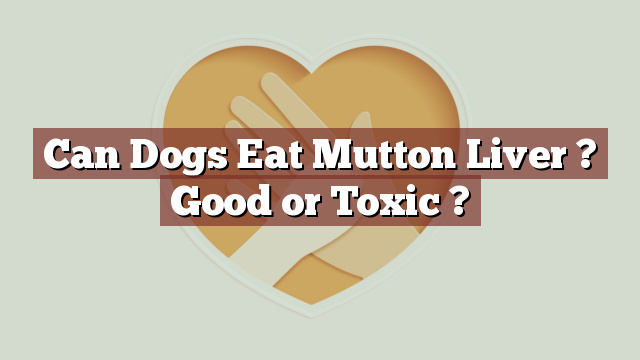Can Dogs Eat Mutton Liver? Good or Toxic?
As responsible pet owners, it is crucial to be well-informed about the foods that are safe for our furry friends. Feeding them a balanced and nutritious diet is essential for their overall health and well-being. One such food that often raises questions among dog owners is mutton liver. In this article, we will delve into the topic of whether dogs can safely consume mutton liver or if it poses any potential risks.
Nutritional Value of Mutton Liver for Dogs: A Detailed Analysis
Mutton liver is known for its high nutritional value, not just for humans but also for dogs. It is a rich source of essential vitamins and minerals, including vitamin A, vitamin B complex, iron, copper, and zinc. These nutrients play a vital role in maintaining the overall health of our canine companions. Vitamin A, for instance, promotes good vision, strengthens the immune system, and supports healthy growth and development.
Is It Safe for Dogs to Eat Mutton Liver or Is It Toxic?
Can dogs eat mutton liver? Yes, dogs can safely consume mutton liver in moderation. However, it is important to exercise caution and ensure that it is prepared properly. Raw or undercooked mutton liver can be potentially harmful to dogs as it may contain harmful bacteria or parasites. Therefore, it is crucial to cook the liver thoroughly before offering it to your furry friend.
Veterinary experts recommend feeding mutton liver to dogs as an occasional treat rather than a regular part of their diet. This is because excessive consumption of liver, including mutton liver, can lead to vitamin A toxicity. Therefore, while dogs can eat mutton liver, it should be given in moderation to prevent any potential health issues.
Potential Risks and Benefits of Feeding Dogs Mutton Liver
When it comes to feeding mutton liver to dogs, there are both risks and benefits to consider. As mentioned earlier, mutton liver is a great source of essential nutrients that promote good health in dogs. However, excessive consumption can lead to an overdose of vitamin A, which can have adverse effects.
Symptoms of vitamin A toxicity may include bone abnormalities, joint pain, loss of appetite, weight loss, and even liver damage. It is important to monitor your dog’s intake of mutton liver and ensure that it is offered in moderation to prevent any potential health risks.
On the other hand, the benefits of feeding mutton liver to dogs include improved skin and coat health, enhanced immune function, and increased energy levels. The key lies in finding the right balance and offering mutton liver as an occasional treat rather than a regular part of their diet.
What to Do if Your Dog Eats Mutton Liver: Steps and Precautions
If your dog accidentally consumes a large amount of mutton liver or shows any symptoms of vitamin A toxicity, it is crucial to seek veterinary assistance immediately. A professional examination can help determine the best course of action and necessary treatment for your furry companion.
Precautions should be taken to ensure that the mutton liver is cooked thoroughly before offering it to your dog. This eliminates the risk of harmful bacteria or parasites that may be present in raw or undercooked liver. It is recommended to consult your veterinarian regarding the appropriate portion size and frequency of feeding mutton liver to your dog.
Conclusion: Weighing the Pros and Cons of Dogs Consuming Mutton Liver
In conclusion, dogs can safely consume mutton liver in moderate amounts. It provides valuable nutrients that contribute to their overall health and well-being. However, it is important to be cautious and ensure proper preparation to avoid any potential risks. Moderation is key when it comes to feeding mutton liver to dogs to prevent vitamin A toxicity.
As responsible pet owners, it is always advisable to consult your veterinarian for guidance on your dog’s dietary needs and to address any concerns or questions regarding specific foods. By being well-informed and taking necessary precautions, we can ensure that our furry companions enjoy a healthy and balanced diet.
Thank you for investing your time in exploring [page_title] on Can-Eat.org. Our goal is to provide readers like you with thorough and reliable information about various dietary topics. Each article, including [page_title], stems from diligent research and a passion for understanding the nuances of our food choices. We believe that knowledge is a vital step towards making informed and healthy decisions. However, while "[page_title]" sheds light on its specific topic, it's crucial to remember that everyone's body reacts differently to foods and dietary changes. What might be beneficial for one person could have different effects on another. Before you consider integrating suggestions or insights from "[page_title]" into your diet, it's always wise to consult with a nutritionist or healthcare professional. Their specialized knowledge ensures that you're making choices best suited to your individual health needs. As you navigate [page_title], be mindful of potential allergies, intolerances, or unique dietary requirements you may have. No singular article can capture the vast diversity of human health, and individualized guidance is invaluable. The content provided in [page_title] serves as a general guide. It is not, by any means, a substitute for personalized medical or nutritional advice. Your health should always be the top priority, and professional guidance is the best path forward. In your journey towards a balanced and nutritious lifestyle, we hope that [page_title] serves as a helpful stepping stone. Remember, informed decisions lead to healthier outcomes. Thank you for trusting Can-Eat.org. Continue exploring, learning, and prioritizing your health. Cheers to a well-informed and healthier future!

